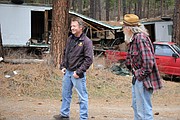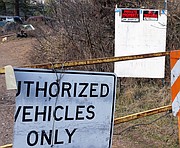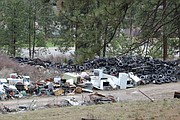End of era for Alberton dump site
Kathleen Woodford Mineral Independent | Hagadone News Network | UPDATED 8 years, 7 months AGO
On the west end of Alberton, there are two parcels of land perched on the north side of Interstate 90 that contain neighboring dumps.
From the freeway, passers-by can see old yellow school buses, tires and other refuge dotting the landscape. The lower six-acre parcel belongs to long-time Alberton resident Lee Shutter; the upper 11-acre portion belongs to resident, Joe Hanson.
For nearly 100 years, residents have used the small plot of land as a town dump. But now, people who travel to the site will be greeted by a locked gate and signs that reads, “Private Property, no trespassing, no dump, no removing”. Officially, the dump closed years ago but people still brought their tree trimmings, old furniture, and other refuge there for disposal.
Hanson has always felt it was better for people to have a place to take their waste than to dump it into nearby gullies, ravines and in the forests. That was the premise of his acquiring the property in the first place. Fred Thompson, who owned the Thompson Ranch located east of town had given Hanson the property in 1970.
“I went to Fred and asked what he was going to do with it and he asked what I wanted to do with it? I just figured I could do something with it, not sure what,” Hanson said. Thompson had replied, “good, I’ll give you the same offer I gave to the town. As long as you pick up the stuff off of the ranch and provide a service to the town of Alberton for people to get rid of their stuff and so they’ll quit dumping it on my ranch, we got a deal,” and the transaction was sealed with a handshake.
“I even went out there not too long ago and hauled some stuff up. Even though he’s been dead for 30 years,” Hanson said.
But the deal made with a handshake had come to an end when Hanson received a letter from the Department of Environmental Quality (DEQ) on August 2, 2016 stating he was in violation of the solid Waste Management and Motor Vehicle Recycling and Disposal Acts.
The letter stated that on May 26, 2017, Susan Bawden of the Enforcement Division had been given permission to enter the property in order to access the Shutter property. It was during that investigation that Bawden saw numerous violation including storage of solid waste, junk vehicles, unlabeled drums of used oil, and containers of unknown materials on the property.
The letter went onto to state that the department had received previous complaints on the property and had sent Hanson violations letters dated Dec. 4, 2004, Jan. 12, 2005 and May 3, 2006. Based on their “observations on June 29, 2016, it does not appear that the Property has achieved compliance with the corrective actions outlined in the Violation Letters.” It went on to state the DEQ also denied Hanson his application for Adios Recycling Motor Vehicle Wrecking Facility on Oct. 4, 2007.
Hanson was required to contact the agent by Aug. 15, 2016 and had to submit a detailed compliance plan with a schedule to achieve compliance. Since then, Hanson has locked the gate, put up the no dumping signs and has been working with Mason Mikkola at Pacific Recycling to crush out the junk vehicles and remove other scrap metal waste. He has also hauled tires to Polson and is in the process of disposing of the waste material in the barrels which consist of used motor oil and old cooking grease from area cafes.
Both Hanson’s and Shutter’s property is littered with old commercial vehicles, school buses, and piles of tires and scrap metal. Old appliances are lined up next to an old mobile home which is filled with books, clothes and other household items reminiscent of a yard sale. Oftentimes, people would come up to the dump and scrounge around for parts off of the appliances or junk vehicles. Hanson has always felt it was more of recycling opportunity than a dump.
“More people need a recycling mentality,” Hanson said, “they need to think more creatively and turn waste into a resource. You know one man’s trash is another man’s treasure.”
But that’s not how DEQ views the situation, “currently, you are in violation of the Solid Waste Manage Act as solid waste is being store and disposed of on the Property. Items such as waste tires, household garbage, and construction and demolition debris are considered solid waste…You are also in violation of Motor Vehicle Recycling and Disposal Act and possess four or more junk vehicles on the Property. In addition, buying, selling or dealing in second hand motor vehicle parts is also a violation of the Act.”
The dump also has old farm equipment, boats, and motor homes tucked along the dirt road that winds around the property. But these items are under another jurisdiction and are not a part of this citation. Which means the area will not be completely cleaned up anytime soon.
It contains almost a hundred years of garbage and Hanson said he doesn’t have the money or resources to clean it all up himself. Which is another frustration he’s had dealing with DEQ because they tell him to clean it up and then give him a list of places to contact to take items. But oftentimes, the places can’t accommodate him.
“I’ll call places that say they take old electronics,” Hanson said, “but then I get them on the phone and they say they don’t do that anymore.”
It’s an overwhelming prospect for Hanson, who’s in his late 70’s and is running low on funds and energy. Often clad in oil stained coveralls, Hanson has been a town fixture when it comes to getting things done. With a shaggy white beard, long hair and baseball cap, he’s a part of a group of men who call themselves “team ready” and always lend a hand when a project needs to be done. Whether it’s rescuing someone in a stranded car, replacing a water heater, or mopping up a flood in someone’s basement, they are there to help. Hanson has also served on the town’s council and has been Mayor a few times.
Over the years, he’s managed to scrape by with towing and automotive repair plus when scrap metal prices were reasonable he could sometimes make a small profit. Oftentimes, the scrap metal funds would make their way back into community projects.
Currently, there are about 50 cars left to crush and get out by his October deadline and they won’t take a week to process once they get started he said. Soon after the gate was locked, someone had dumped appliances and garbage into a ravine just above the Thompson Ranch. A local resident took the time to pull it up and hauled it to the dump in Missoula at a cost of $30.
“You can’t expect people to do that,” Hanson commented. There are people who can’t afford to pay for waste disposal, or simply don’t care and so they dump in the forests and in nearby gullies and ravines. “It’s a foul bird that craps in its own nest,” he said.
He also expressed frustration over DEQ’s focus on his property, when looking around the town of Alberton there are several residences with junk vehicles and other garbage strewn around the property and nothing is done about it. Especially since he views the dump as providing a service to the community to help keep the area cleaned up and it allows opportunity for recycling, “there’s never been any money in it (the dump),” he said.
The problem of waste disposal is nothing new. According to The World Counts website, over 50 tons of household waste is thrown out every second globally. The site states that, “we need to find new ways to solve the increasing waste-problem. The “cradle-to-cradle” approach implies essentially waste free regenerative systems.”
For example, there are processes being developed that converts recycled tires back into products such as plastic or burned for fuel. Also, in some European products there’s an end-of-life cost added into the cost of a product which covers expenses for the products disposal.
“But here we have DEQ who focuses on these violations and close the dump, but they don’t give any solutions. They just say it’s not their department. But if the government departments talked to each other, they could come up with a better way of handling things like this,” he said. For example if DEQ worked with recycling facilities, or with nonprofits who provide funding for cleanups. Perhaps more could be done. For now he worries that with his gate closed, people will simply start dumping on forest service land or back up at the Thompson Ranch.
ARTICLES BY KATHLEEN WOODFORD MINERAL INDEPENDENT
Mineral County sends tax bill to Forest Service
The Forest Service will be receiving a property tax bill from Mineral County this year. County Commissioners Laurie Johnston, Roman Zylawy and Duane Simons signed the letter March 9 requesting property tax revenue for 2017. The “historic letter” as defined by Rep. Denley Loge, describes the plight Mineral County is facing as options to fund the county have dried up.
Colorado woman dies after vehicle gets stuck
An early evening call received by Mineral County dispatch on Friday, March 17, ended in tragedy. The body of Colorado resident Debra Ann Koziel was found in the Fish Creek area by a search team the following Tuesday afternoon. Her death was determined to be the result of exposure to weather.

No major flooding as snow thaws
“As the ground starts thawing, the rocks start falling,” was a post made on the Mineral County Sheriff’s Office’s Facebook page last week. A photo accompanied the post of a big rock which had come down on Mullan Road East near the Big Eddy fishing access in Superior on March 11. “Please be aware of your surroundings and pay attention while driving,” they warned in the post.







